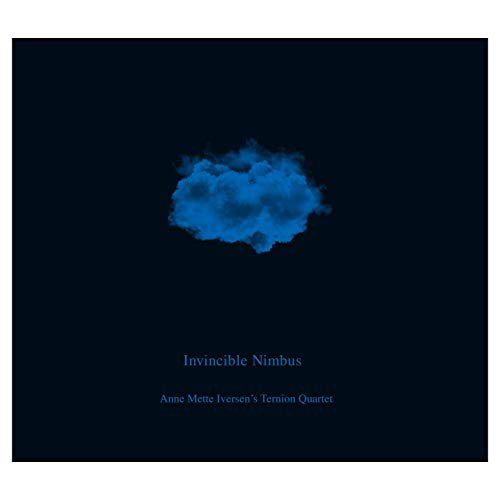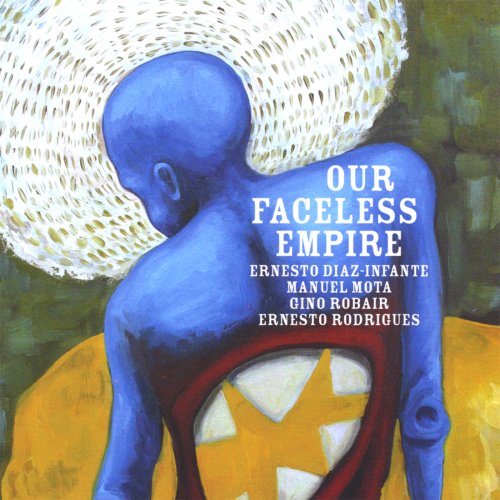Anne Mette Iversen's Ternion Quartet - Invincible Nimbus (2019) Hi Res

Artist: Anne Mette Iversen's Ternion Quartet
Title: Invincible Nimbus
Year Of Release: 2019
Label: Brooklyn Jazz Underground Records
Genre: Jazz
Quality: 320 kbps | FLAC (tracks) | 24Bit/44 kHz FLAC
Total Time: 00:51:59
Total Size: 119 mb | 282 mb | 544 mb
WebSite: Album Preview
Tracklist:Title: Invincible Nimbus
Year Of Release: 2019
Label: Brooklyn Jazz Underground Records
Genre: Jazz
Quality: 320 kbps | FLAC (tracks) | 24Bit/44 kHz FLAC
Total Time: 00:51:59
Total Size: 119 mb | 282 mb | 544 mb
WebSite: Album Preview
01. Polychromatic Pictures
02. Within a Diapason
03. The Invincible Nimbus of Mystery
04. Ghost Word 1
05. Dig Your Heels In
06. Four Snakes
07. Ghost Word 3
08. The Rose Window
09. Ionian Steps
10. Ghost Word 2
Personnel:
Anne Mette Iversen, double bass
Silke Eberhard, alto saxophone
Geoffroy De Masure, trombone
Roland Schneider, drums
Ternion Quartet’s sophomore album, Invincible Nimbus (available May 10 on Brooklyn Jazz Underground Records), which showcases an ensemble of highly-creative, accomplished artists utterly in tune and musically enamored with one another, stretching out their seemingly inexhaustible imaginations, is about selflessness and being open to dialogue. Iversen elaborated that, “In music there is no room for selfishness. Music only lives and thrives when a dialogue is present. Only by giving room to others, by listening and by taking part in the conversation, can we lift ourselves out of the needy, greedy, self-centered orientation that threatens to grab us all. This is evident to all of us who are intimately familiar with music - and this is what we all intuitively respond to and love about music. My hope is that music can inspire more people, and especially people who have the power to make a difference in our current state of the world, to listen, omit selfishness and to respect other ideas than their own.”
On Invincible Nimbus Ms. Iversen flexes her considerable composing chops, and while writing the music for this album she was studying different classical composing theories, and trying out approaches and techniques that she had not worked with consciously before. Iversen was especially focused on melody and harmony, and found herself experimenting with ways to apply the 12-tone scale to a jazz composition, ways to incorporate fugue-writing techniques and ideas from Messian’s ‘The Technique of My Musical Language’. The composer also searched for new sounds in Slonimsky’s ‘Thesaurus of Scales and Melodic Patterns’, and had ideas for some challenging rhythmic material that the band had fun working with in the rehearsals (check out ‘Dig Your Heels In’). While writing and recording Iversen eschewed compartmentalizing her music into genre or style. The ensemble simply played, worked out their sound for these compositions, and engaged in the musical dialogues.
Ternion Quartet is fronted by two amazing artists, alto saxophonist Silke Eberhard (rising star, DownBeat Magazine 2015 & 2017), and trombonist Geoffroy De Masure (professor at The Jazz Institute of Berlin), and is brilliantly supported, buoyed and propelled by Ms. Iversen and long-time friend and colleague from NYC, German-born drummer Roland Schneider. Iversen composes to allow the musicians unlimited space for their creative input, which is imperative to having a true dialogue. “The compositions I bring to the band are open pages. I do not dictate how anyone should play. The composition comes alive when each musician contributes what he or she hears and feels. The composition is an opening statement, setting the topic for the discussion, and the dialogue is the means for us to get the most out of each and every experience. We can be very different people, and we are, but because we share the values of keeping an open mind, being curious, respectful, and humble, the interactive dialogue we have with each other moves us and the music forward and the composition comes alive!”, said Iversen.
The compelling album title, Invincible Nimbus, comes from classical mythology in which a nimbus is a cloud that surrounds a God or Goddess when he/she is on earth. Iversen liked the idea that this kind of aura is not something that can be destroyed, no matter what is done to the God/Goddess. “I guess I wish that we, humans, would find ourselves so strong that the aura that we are born with as children, the light that you see in the eyes of most children, would stay with us, and not disappear through being hurt or disappointed or manipulated into being something else than who we are. I believe that if we could meet each individual and not expect them to be anything else than who they are, then we would also be able to have an invincible nimbus around us,” said Iversen. So the Invincible Nimbus album is about being still and engaging in true dialogues. Iversen elaborated, “our upbringing and our societies may not support the mindset that we were given at birth, i.e. a natural curiosity, trust and the need to explore, but this should be the base of our lives. We need to rediscover this foundation within ourselves, so that we can grow to the maximum potential and an important tool for that is in my opinion, dialogue.”
On Invincible Nimbus Ms. Iversen flexes her considerable composing chops, and while writing the music for this album she was studying different classical composing theories, and trying out approaches and techniques that she had not worked with consciously before. Iversen was especially focused on melody and harmony, and found herself experimenting with ways to apply the 12-tone scale to a jazz composition, ways to incorporate fugue-writing techniques and ideas from Messian’s ‘The Technique of My Musical Language’. The composer also searched for new sounds in Slonimsky’s ‘Thesaurus of Scales and Melodic Patterns’, and had ideas for some challenging rhythmic material that the band had fun working with in the rehearsals (check out ‘Dig Your Heels In’). While writing and recording Iversen eschewed compartmentalizing her music into genre or style. The ensemble simply played, worked out their sound for these compositions, and engaged in the musical dialogues.
Ternion Quartet is fronted by two amazing artists, alto saxophonist Silke Eberhard (rising star, DownBeat Magazine 2015 & 2017), and trombonist Geoffroy De Masure (professor at The Jazz Institute of Berlin), and is brilliantly supported, buoyed and propelled by Ms. Iversen and long-time friend and colleague from NYC, German-born drummer Roland Schneider. Iversen composes to allow the musicians unlimited space for their creative input, which is imperative to having a true dialogue. “The compositions I bring to the band are open pages. I do not dictate how anyone should play. The composition comes alive when each musician contributes what he or she hears and feels. The composition is an opening statement, setting the topic for the discussion, and the dialogue is the means for us to get the most out of each and every experience. We can be very different people, and we are, but because we share the values of keeping an open mind, being curious, respectful, and humble, the interactive dialogue we have with each other moves us and the music forward and the composition comes alive!”, said Iversen.
The compelling album title, Invincible Nimbus, comes from classical mythology in which a nimbus is a cloud that surrounds a God or Goddess when he/she is on earth. Iversen liked the idea that this kind of aura is not something that can be destroyed, no matter what is done to the God/Goddess. “I guess I wish that we, humans, would find ourselves so strong that the aura that we are born with as children, the light that you see in the eyes of most children, would stay with us, and not disappear through being hurt or disappointed or manipulated into being something else than who we are. I believe that if we could meet each individual and not expect them to be anything else than who they are, then we would also be able to have an invincible nimbus around us,” said Iversen. So the Invincible Nimbus album is about being still and engaging in true dialogues. Iversen elaborated, “our upbringing and our societies may not support the mindset that we were given at birth, i.e. a natural curiosity, trust and the need to explore, but this should be the base of our lives. We need to rediscover this foundation within ourselves, so that we can grow to the maximum potential and an important tool for that is in my opinion, dialogue.”




![Chris Forsyth's WHAT IS NOW - Both / And (2026) [Hi-Res] Chris Forsyth's WHAT IS NOW - Both / And (2026) [Hi-Res]](https://www.dibpic.com/uploads/posts/2026-02/1771839412_cover.jpg)
![VA - 20 Years Into An Infinite Musical Journey (2025) [SACD] VA - 20 Years Into An Infinite Musical Journey (2025) [SACD]](https://www.dibpic.com/uploads/posts/2026-02/1771834929_ff.jpg)


